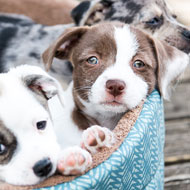Kennel Club welcomes new Lucy's Law

There has been a surge in interest in getting a puppy in the last month.
The introduction of Lucy's Law, which bans the third-party sale of puppies and kittens, has been hailed by The Kennel Club as a 'long awaited and welcome step'.
The new law, which came into force on Monday (6 April) means that third-party sellers, such as pet shops or commercial dealers in England can no longer sell puppies or kittens, unless they have bred the animal themselves. Anyone wanting to adopt a puppy or kitten under the age of six months must now go direct to a licenced breeder, or consider adopting one from a rescue centre.
“Sadly, too often irresponsible breeders in the UK and abroad have depended on commercial third party sellers – like ‘dealers’ or pet shops – to disguise the horrific conditions puppies are bred and brought up in to the public, readily making a huge profit while causing untold suffering,” said Holly Conway, head of public affairs at the Kennel Club.
“We hope Lucy’s Law will help bring an end to this and that, as well as improving welfare conditions for puppies, it will also encourage anyone thinking of getting a puppy to really do their research, find a responsible breeder and bring home a happy, healthy new addition to the family.”
Her comments come as new figures reveal a surge in public interest in getting a puppy in the last month.
The figures show that searches for new puppies via the Kennel Club's '‘Find a Puppy’ tool increased by 53 per cent from February to March, with the biggest spike seen in the week leading up to lockdown – the 16th - 23rd of March. Searches were up 37 per cent compared to the previous week, and 84 per cent compared to the same week in 2019.
Commenting on this rise in interest, Holly said: “With people staying at home, meaning they have more time on their hands and to spend with family, it’s perhaps unsurprising that some are thinking about getting a puppy. While we would underline that now may not be the right time to bring home a puppy, or make an impulsive decision to get a pet, these figures could be a sign of more people looking to find a breeder directly in the future, which is extremely positive and what Lucy’s Law aims to impose.”



 The Veterinary Medicines Directorate (VMD) is inviting applications from veterinary students to attend a one-week extramural studies (EMS) placement in July 2026.
The Veterinary Medicines Directorate (VMD) is inviting applications from veterinary students to attend a one-week extramural studies (EMS) placement in July 2026.